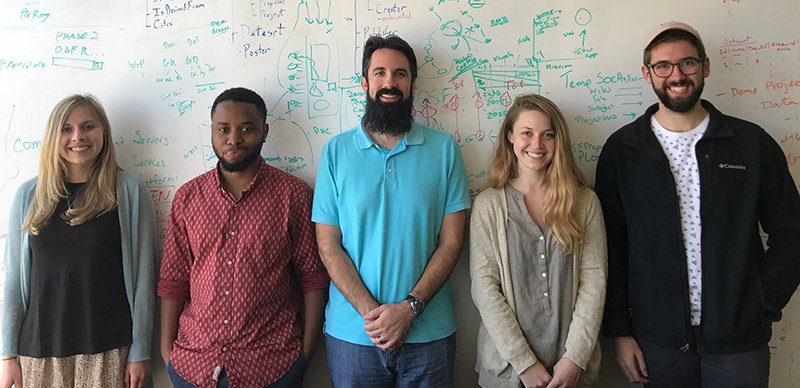
Two items this past week point to challenges for diversity and inclusion in open science. First, a WIRED story reported evidence that gender diversity in open source software is even worse than in technology more generally. A paltry 3% identified as female, compared to BLS statistics suggesting that 22.6% of programmers are female. And, second, a sprawling twitter discussion (partly here) indicated that there is work to do in making the open science movement more inclusive.
There are many things to do to promote inclusivity in open science writ large. I will comment briefly on the importance of diversity and inclusion at the Center for Open Science (COS). COS is a non-profit technology and culture change organization with a mission to increase openness, integrity, and reproducibility of research. Most of our 60 person full-time staff are part of the infrastructure team - particularly software developers, product managers, and quality assurance associates. The team builds exclusively free, open source software. We also employ scholars and scientists from a variety of backgrounds on our metascience team to conduct research and on our community team to promote culture change via adoption of our free products and services and with direct training of open and reproducible research and statistical practices. In short, we are deeply invested in both open source and open science.
For COS, the mission to open science means increasing transparency and sharing AND increasing inclusivity. Everyone has a stake in science, so anyone with interest should be able to get involved as a consumer, evaluator, or producer of research. Minimizing barriers to engagement in science maximizes the likelihood of efficiently obtaining key insights and advances for accelerating discovery. Open science offers the promise of democratizing access and engagement in research, but it doesn’t guarantee that it will occur. True inclusivity requires sustained, evidence-based efforts to remove established cultural and structural barriers, as well as attention to implicit biases that can subtly undermine diversity, inclusion, and feelings of belonging.
We have some background in diversity and inclusion, and what organizations might do to help foster an inclusive environment internally and in the culture more generally. For example, before starting COS, I directed Project Implicit, another non-profit co-founded in 1998 by myself, Mahzarin Banaji, and Tony Greenwald to coordinate our laboratories’ research and education about implicit bias. My involvement in this area of research began in Mahzarin’s lab in 1996 with my master’s thesis investigating the role of implicit gender stereotypes and attitudes for understanding sex differences in engagement in science, technology, engineering and math. Lots more research followed (see my Google Scholar profile and personal website).
Project Implicit is now led by Kate Ratliff and other former members of my lab at the University of Virginia, who now have their own faculty positions in other places: Colin Tucker Smith, Carlee Hawkins, Yoav Bar-Anan, and Calvin Lai. Meanwhile, COS is an opportunity to translate some of the research evidence from our lab and others in the field into practice. This includes (1) defining organizational policies and employee guides that promote inclusivity and flexibility for the life circumstances that people experience, (2) a robust internship program that accelerates capacity of early career developers from a variety of backgrounds, and (3) developing an internal culture that is pro-actively welcoming, supportive, and facilitating the growth of all team members skills and career opportunities. We are proud of the progress that we have made so far with a fantastic team. For example, 12 of the 38 full-time members of the infrastructure team are women (32%).
Simultaneously, we have work to do. Overall gender diversity is ahead of the industry and particularly the open source community, but we are making slower progress in our senior staff hiring. Also, we have lots of room to improve in diversity by other underrepresented groups in science and technology, particularly by race and ethnicity. Every day, we can do better to make the COS environment, and its programs that engage the broader community, more open and welcoming for all so that everyone feels a sense of belonging to COS and its mission. Of course, continuous effort at being more inclusive is as central to our organizational mission as our continuous emphasis on QA to ensure the quality of software that we provide to our users. As Virginia Valian said once during a symposium we did together (paraphrasing), “Many people think of diversity and inclusion like fixing your roof--do some focused work on it and then you’ll be good for 30 years. Really, it is like taking out the trash. You need to keep at it every week. If you don’t, eventually the place will start to stink.”

6218 Georgia Avenue NW, Suite #1, Unit 3189
Washington, DC 20011
Email: contact@cos.io

Unless otherwise noted, this site is licensed under a Creative Commons Attribution 4.0 International (CC BY 4.0) License.
Responsible stewards of your support
COS has earned top recognition from Charity Navigator and Candid (formerly GuideStar) for our financial transparency and accountability to our mission. COS and the OSF were also awarded SOC2 accreditation in 2023 after an independent assessment of our security and procedures by the American Institute of CPAs (AICPA).
We invite all of our sponsors, partners, and members of the community to learn more about how our organization operates, our impact, our financial performance, and our nonprofit status.